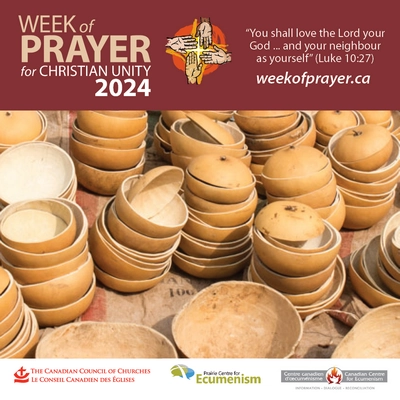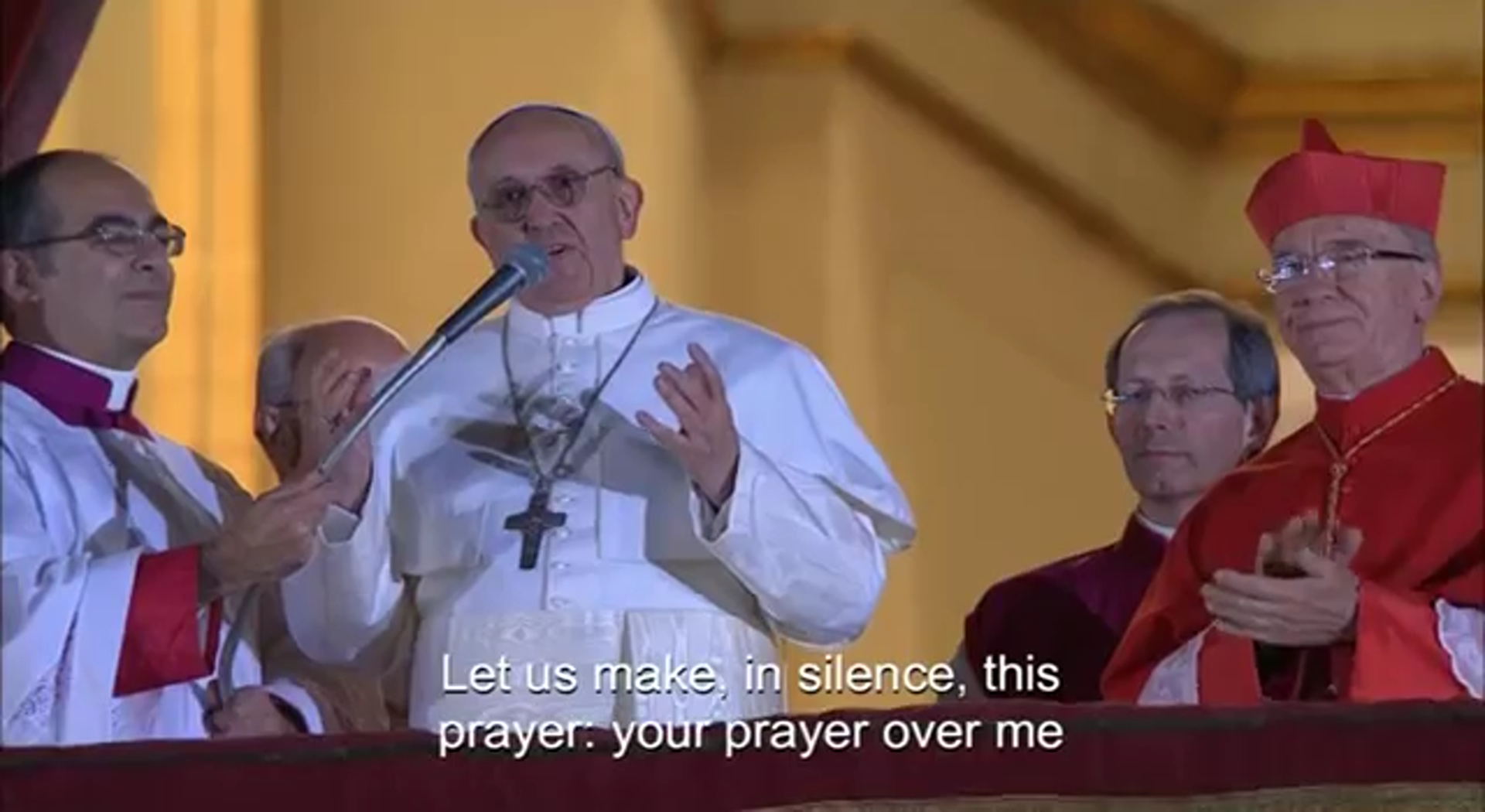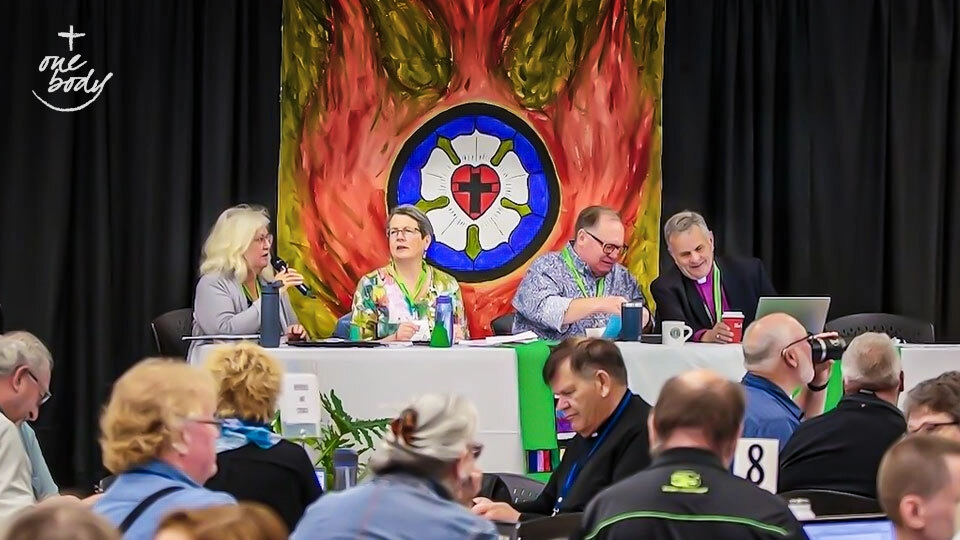- Français
- |
- Booklist
- |
- Week of Prayer
- |
- Links
- Areopagus - a forum for dialogue
- Academic journals
- Acronyms
- Bible tools
- Bibliographies
- Booksellers and publishers
- Churches
- Canadian church headquarters
- Directory of Saskatchewan churches
- Retreat centres
- Saskatchewan church and non-profit agencies
- Ecumenism.net Denominational links
- Anabaptist & Mennonite
- Anglican
- Baptist
- Evangelical
- Independent episcopal
- Lutheran
- Methodist, Wesleyan, and Holiness
- Miscellaneous
- Mormon
- Orthodox (Eastern & Oriental)
- Para-church ministries
- Pentecostal / charismatic
- Presbyterian & Reformed
- Quaker (Society of Friends)
- Roman & Eastern Catholic
- United and uniting
- Documents of Ecumenical Interest
- Ecumenical agencies
- Ecumenical Booklist
- Ecumenical Dialogues
- Glossary
- Human rights
- Inter-religious links
- Justice & peace
- Lectionaries
- Religious news services
- Resource pages
- Search Ecumenism.Net
- |
- Documents
- Ancient & Medieval texts
- Ecumenical Dialogues
- Interreligious
- Anabaptist & Mennonite
- Anglican
- Evangelical
- Lutheran
- Orthodox
- Reformed & Presbyterian
- Roman & Eastern Catholic
- United & Uniting
- Miscellaneous churches
- Canadian Council of Churches (CCC)
- Conference of European Churches (CEC)
- Interchurch Families International Network (IFIN)
- National Council of Churches in Australia (NCCA)
- Lausanne Committee for World Evangelism (LCWE)
- World Council of Churches (WCC)
- Other ecumenical documents
Church traditions
Documents from ecumenical agencies
- |
- Dialogues
- Adventist-Reformed
- African Instituted Churches-Reformed
- Anglican-Lutheran
- Anglican-Orthodox
- Anglican-Reformed
- Anglican-Roman Catholic
- Anglican-United/Uniting
- Baptist-Reformed
- Disciples of Christ-Reformed
- Disciples of Christ-Roman Catholic
- Evangelical-Roman Catholic
- Lutheran-Mennonite
- Lutheran-Mennonite-Roman Catholic
- Lutheran-Reformed
- Lutheran-Roman Catholic
- Mennonite-Reformed
- Mennonite-Roman Catholic
- Methodist-Reformed
- Methodist-Roman Catholic
- Oriental Orthodox-Reformed
- Orthodox-Reformed
- Orthodox-Roman Catholic
- Pentecostal-Reformed
- Prague Consultations
- REC-WARC Consultations
- Roman Catholic-Lutheran-Reformed
- Roman Catholic-Reformed
- Roman Catholic-United Church of Canada
- |
- Quick links
- Canadian Centre for Ecumenism
- Canadian Council of Churches
- Ecumenical Shared Ministries
- Ecumenism in Canada
- Interchurch Families International Network
- International Anglican-Roman Catholic Commission for Unity and Mission
- Kairos: Canadian Ecumenical Justice Initiatives
- North American Academy of Ecumenists
- Prairie Centre for Ecumenism
- Réseau œcuménique justice et paix
- Week of Prayer for Christian Unity
- Women's Interchurch Council of Canada
- World Council of Churches
- |
- Archives
- |
- About us
Spotlight on the ELCIC | One Body
A few weeks ago, I attended the Synod Convention of the ELCIC Saskatchewan Synod. The ELCIC is the Evangelical Lutheran Church in Canada, one of the more ecumenically engaged churches in Canada. I have known the ELCIC in Saskatchewan for many years. In fact, when I was the executive director of the Prairie Centre for Ecumenism in the 1990s, the ELCIC was one of our seven sponsoring churches and I worked very closely with the Saskatchewan bishop, clergy, and many lay people.
In some ways, attending the Synod Convention was a homecoming. There were many people there that I have known for 20 or 30 years. Although the Synod Convention is a governing council of the ELCIC with a long business agenda, the convention is also a time of gathering for this church spread across Saskatchewan. People come to see friends and remember past ministries. There were many prayer and social times to build up the community. As an invited observer from the Catholic Church, I was welcomed with hugs and I shared numerous conversations over the weekend about ministry together, past and present.
In this post, I want to introduce you to the ELCIC to help you see why this small church is of great importance to our ecumenical relations in Canada.
Read the rest of this article in the One Body blog on Salt+Light Media
Lutherans have their origin in the Reformation period when Martin Luther protested against certain excesses of the late medieval church, particularly around the sale of indulgences. His writings focused on the doctrine of justification by faith, which he found most clearly in Romans 5, and which he contrasted with church practices regarding penance, indulgences, devotions to the saints, and other pious practices. In these church practices, he found a “works righteousness,” where he heard the medieval church teaching that the good works of the pious merit their salvation. The Reformation slogan was “sola fide, sola gratia, sola scriptura, et solus Christus” or “faith alone, grace alone, scripture alone, and Christ alone.” Only by faith in Christ alone, which is solely a gift of grace, can we be found just or righteous before God. This teaching, which is essential for salvation, can be established on the sole authority of Scripture. The Lutheran position is sometimes described as “forensic righteousness,” which means that God declares the sinner righteous, not on account of their own merit but on the merit of Christ which is imputed to the sinner.
Addressing the very real abuses of the time, the Council of Trent (1545-1563) insisted that it is Christ’s sacrifice that merits salvation, but also that good works are not irrelevant to the salvation of believers. “Faith by itself, if it has no works, is dead” (James 2:17). The Catholic position, which is sometimes contrasted with the Reformation notion of justification is called sanctification. Catholics understand the process of justification to involve a growth in holiness through a life of prayer, sacraments, and cultivating virtue. We call this process sanctification. The contrast between the Lutheran teaching and the Council of Trent led to centuries of polemic that hardened the positions of either side. It was only in 1999 that the Lutheran World Federation and the Vatican were able to issue the “Joint Declaration on the Doctrine of Justification,” in which we confess together that:
Justification is the work of the triune God. The Father sent his Son into the world to save sinners. The foundation and presupposition of justification is the incarnation, death, and resurrection of Christ. Justification thus means that Christ himself is our righteousness, in which we share through the Holy Spirit in accord with the will of the Father. Together we confess: By grace alone, in faith in Christ’s saving work and not because of any merit on our part, we are accepted by God and receive the Holy Spirit, who renews our hearts while equipping and calling us to good works (#15).
Lutheran emigration to North America began in the 17th century, first from Germany and then from Scandinavia. Many of the Lutheran churches in Europe were official state churches, and tended to be “high churches” with an emphasis on formal liturgy, sacraments, and church authority. As Lutherans experienced a wave of “pietism,” similar to the revival movements that led to Puritanism and Methodism in England, small Pietist sects broke away from the established churches. Many of the Lutheran emigrants brought this pietism to North America, where they established churches and denominations. Lutherans used the word “synod” to refer to a grouping of like-minded churches. In keeping with their ethos and their experience of repression by the established churches, pietists tended to shun formal expressions of church authority. However, as time passed, they began to coalesce into larger “synods” identified with particular areas in the US and Canada, as well as their languages of origin and worship.
There is a remarkable story of Lutheran church union beginning in the early 20th century and culminating in the 1980s, as more than 50 different Lutheran denominations merged, and then merged again, until there were three principal churches in Canada: the American Lutheran Church (ALC), the Lutheran Church in America (LCA), and the Lutheran Church Missouri Synod (LCMS). Each of these was a binational church in the US and Canada. In 1985, the Canadian congregations of the ALC and the LCA merged to form the ELCIC. The Missouri Synod had been part of the merger talks but withdrew. Their Canadian section has subsequently become the independent Lutheran Church Canada (LCC). So now there are two major Lutheran churches in Canada, the ELCIC and the LCC, as well as several smaller synods and independent congregations.
The ELCIC has five “synods” across the country. The Eastern Synod includes Ontario, Quebec, and Atlantic Canada. Many of the churches in this synod are of German extraction, while there are also several Norwegian, Swedish, Danish, and Icelandic churches, although worship is generally in English throughout the ELCIC. Each of the four western provinces has a synod due to the larger numbers of Lutherans in these areas, who are principally from the Scandinavian and pietist extraction. There are approximately 95,000 ELCIC members across Canada in 519 congregations.
The ELCIC and its predecessor bodies, the ALC and LCA, have been active ecumenical partners throughout the 20th century. They were founding members of the Canadian Council of Churches in 1944, the Lutheran World Federation in 1947, and the World Council of Churches in 1948. They have been part of numerous interchurch coalitions in Canada. Almost all ecumenical initiatives in Canada since Vatican II have included the five so-called PLURA churches: Presbyterian, Lutheran, United, Roman Catholic, and Anglican.
Canadian Catholics have found the ELCIC to be an easy partner in the “ecumenism of life,” as we share together in local service and mission caring for those in need and advocating for peace and justice. Not long after the ELCIC was founded, a preliminary dialogue was initiated that met regularly between 1986 and 1992. They reported healthy relations between our churches in Canada, noting general agreement on several aspects of ministry rooted in the priesthood of the baptized and identifying several additional areas for continuing dialogue. They made a number of recommendations related to the Eucharist, ministry, and interchurch marriages. More recently, dialogue teams have prepared resources for study of the Joint Declaration on the Doctrine of Justification in 1999 and for the commemoration of the 500th anniversary of the Reformation in 2017.
Beginning in 1983, Canadian Lutherans and Anglicans began discussions about closer relations. In 1986 a formal dialogue was established that led in 1989 to an agreement on the “Interim Sharing of the Eucharist.” Sharing the sacrament led to further efforts to share pastoral life and ministry. In 2001, the two churches established full communion with an agreement known as the Waterloo Declaration. It defined “full communion”
as a relationship between two distinct churches or communions in which each maintains its own autonomy while recognizing the catholicity and apostolicity of the other, and believing the other to hold the essentials of the Christian faith. In such a relationship, communicant members of each church would be able freely to communicate at the altar of the other, and there would be freedom of ordained ministers to officiate sacramentally in either church. Specifically, in our context, we understand this to include transferability of members; mutual recognition and interchangeability of ministries; freedom to use each other’s liturgies; freedom to participate in each other’s ordinations and installations of clergy, including bishops; and structures for consultation to express, strengthen, and enable our common life, witness, and service, to the glory of God and the salvation of the world (p. 2).
There was considerable discussion in the years preceding the Waterloo Declaration about the nature of episcopal ministry, or episcopé. Based upon the WCC’s Baptism, Eucharist and Ministry text, the international Anglican-Lutheran dialogue’s Niagara Report (1987), and the Porvoo Common Statement, the two churches agreed to recognize the historic episcopate in one another. This required a constitutional step in the ELCIC to affirm that the installation of bishops as ordination in the historic episcopate. While the ELCIC still has a six-year term for their bishops, allowing for re-election, their retired bishops are now considered bishops for life. The ELCIC also agreed that ordinations of ministers would only be conducted by bishops. This was a change from the practice in some of the pietistic congregations and synods, especially in Saskatchewan.
A similar full communion agreement in the U.S. between their sister churches, the Evangelical Lutheran Church in America and the Episcopal Church, was also established in 2001. As similar agreements have been established around the world, the ELCIC and ACC have been involved in efforts to standardize the provisions in these agreements and to widen the scope of their full communion. They have now extended the communion to include the two U.S. churches and the Northern Province of the Moravian Church in North America.
At the Saskatchewan Synod Convention, I witnessed a small but vibrant church that is rooted in Prairie life. The distant whisper of Swedish and Norwegian pietism was mixed with the accents of the Asian and African ministers and lay people that make up an increasing number of the Lutherans in their 115 congregations. The presence of youth delegates with full voting privileges spoke to the vibrancy of their part in the ministry of this church. Many ministries affiliated with the Saskatchewan Synod were also represented, including two high schools, an undergraduate college, a seminary, and a university-based campus ministry. Several care homes are also affiliated, along with hospital chaplaincies.
Earlier this year, Bishop Sid Haugen announced his retirement after 10 years. So, the Convention delegates were abuzz with talk of the election for bishop. On Friday morning, the first ballot was announced by Bishop Susan Johnson, the ELCIC national bishop. The ELCIC calls this an “ecclesiastical ballot,” by which they mean that there is no prior nomination process. The delegates may vote for any member of the clergy roster in the ELCIC’s five synods, or in any of the full communion partners. In other elections, a few Anglicans have received votes, but so far nobody outside the ELCIC has been elected as bishop. On the second and subsequent ballots, delegates may only vote for those on the previous ballot. Each time, the candidates with the lowest vote count are dropped from the ballot until one candidate receives sufficient votes to be elected. It is only after the third ballot that candidates are asked to address the Convention, so delegates must vote based on their knowledge of the candidates, and candidates must trust that the Spirit is calling them to this ministry.
It is not unusual for these elections to extend to seven or eight ballots, however in this case the delegates found consensus early. Rev. Dr. Ali Tote received a two-thirds majority on the second ballot, making him the bishop-elect. He will be consecrated in the coming months. After the results were announced, Tote shared how he was grateful and humbled by the election. “My story – moving to Canada and being embraced and loved has been what has driven me to open my arms in return,” he said. “Together we will journey, together we will pray, together we will worship, together we will support, together we will serve.”
Brother Ali, as he is known by his friends, is a graduate of the Lutheran Theological Seminary in Saskatoon, and also holds a Ph.D. in epidemiology. He teaches part-time at the medical college at the University of Saskatchewan. He was a pastor in Saskatoon until he was called to be assistant to Bishop Haugen two years ago. He has also been a strong ecumenical advocate. He currently serves on the Canadian Council of Churches’ Commission on Faith and Witness.
The Saskatchewan Synod is a covenant partner with the five Catholic dioceses of Saskatchewan and the three Anglican dioceses. After the election results were announced, Archbishop Don Bolen sent a quick text message to Bishop-elect Tote congratulating him on his election and assuring him of our prayers and well-wishes for his ministry. We look forward to many years of ministry together.
Nicholas Jesson is the ecumenical officer for the Archdiocese of Regina. He is currently a member of the Anglican-Roman Catholic Dialogue in Canada and of the Canadian Council of Churches’ Commission on Faith & Witness, editor of the Margaret O’Gara Ecumenical Dialogues Collection, and editor of the Anglican-Roman Catholic Dialogue archive IARCCUM.org. He was ecumenical officer for the Diocese of Saskatoon (1994-99 & 2008-17), executive director of the Prairie Centre for Ecumenism (1994-99), and member of the Roman Catholic-United Church of Canada Dialogue (2012-20).

 Permanent link: ecumenism.net/?p=14330
Permanent link: ecumenism.net/?p=14330
Categories: One Body, Opinion • In this article: Evangelical Lutheran Church in Canada

 Lien permanente : ecumenism.net/?p=14330
Lien permanente : ecumenism.net/?p=14330
Catégorie : One Body, Opinion • Dans cet article : Evangelical Lutheran Church in Canada
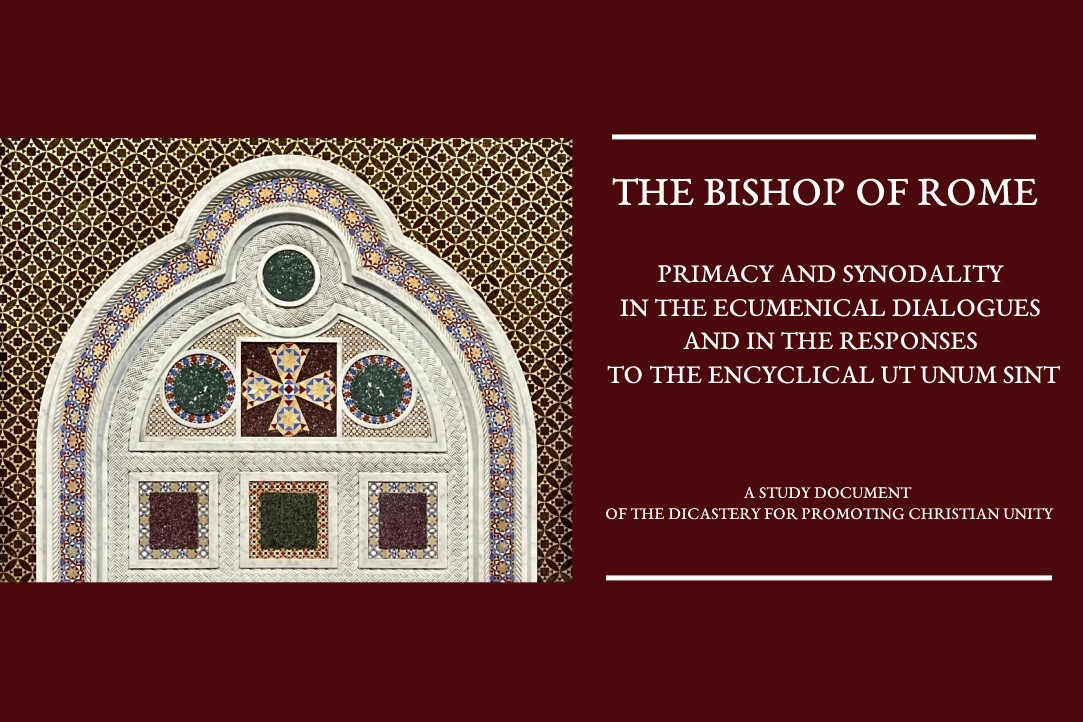
Ecumenism and papal primacy: Vatican proposes reforms
— June 13, 202413 juin 2024
The reason why the 2024 edition of the Vatican yearbook has re-inserted “Patriarch of the West” as one of the historical titles of the pope appears to be a response to concerns expressed by Orthodox leaders and theologians.
For months after the yearbook, the Annuario Pontificio, was released, the Vatican press office said it had no explanation for the reappearance of the title, which Pope Benedict XVI had dropped in 2006.
But new documents from the Dicastery for Promoting Christian Unity place the change squarely in the middle of a broad discussion among all mainline Christian churches on the papacy and the potential role of the bishop of Rome in a more united Christian community.
Members of the dicastery proposed that “a clearer distinction be made between the different responsibilities of the Pope, especially between his ministry as head of the Catholic Church and his ministry of unity among all Christians, or more specifically between his patriarchal ministry in the Latin Church and his primatial ministry in the communion of Churches.”
… Read more » … lire la suite »
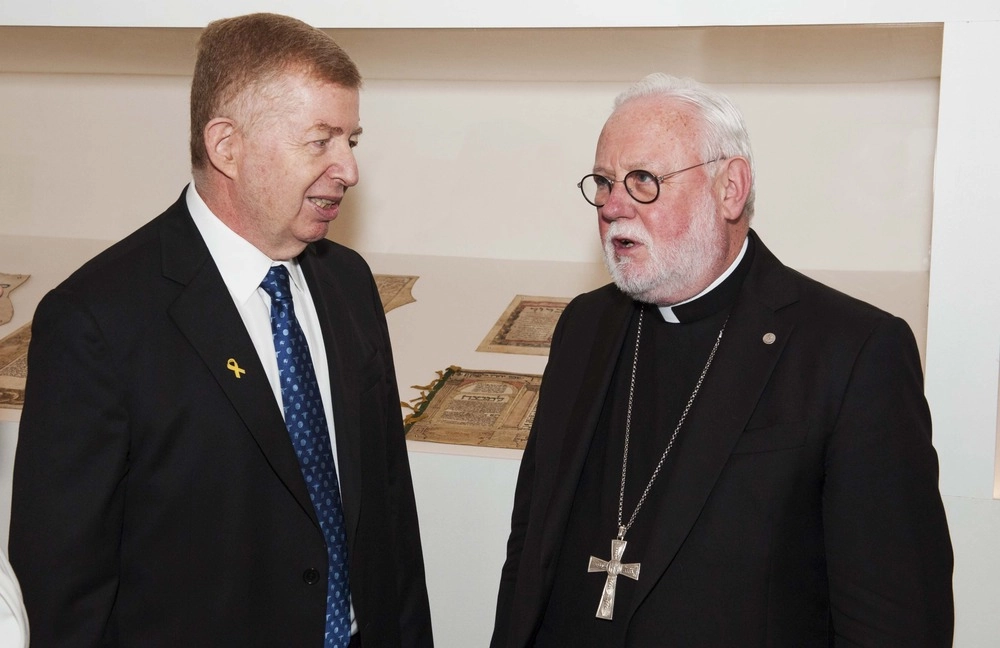
Amid prayers for peace, Vatican-Israeli tensions were on display
— June 7, 20247 juin 2024
The Oct. 7 terrorist attack on Israel and Israel’s massive military response in Gaza have led to strong papal pleas for peace but also to Vatican-Israeli diplomatic tensions.
At a concert and reception June 6, Raphael Schutz, the Israeli ambassador to the Holy See, told guests, “It is no secret that after Oct. 7, at some junctions, Israel and the Holy See have not seen eye to eye the same reality in the Middle East. In such moments, as well as during my 41 years as a diplomat, I’ve believed that being frank and speaking clearly was no opposite to being diplomatic.”
Archbishop Paul R. Gallagher, the Vatican foreign minister, told the ambassador and his guests, “In conflicts, the Holy See must adhere to the principle of neutrality, which does not mean being morally indifferent.”
… Read more » … lire la suite »
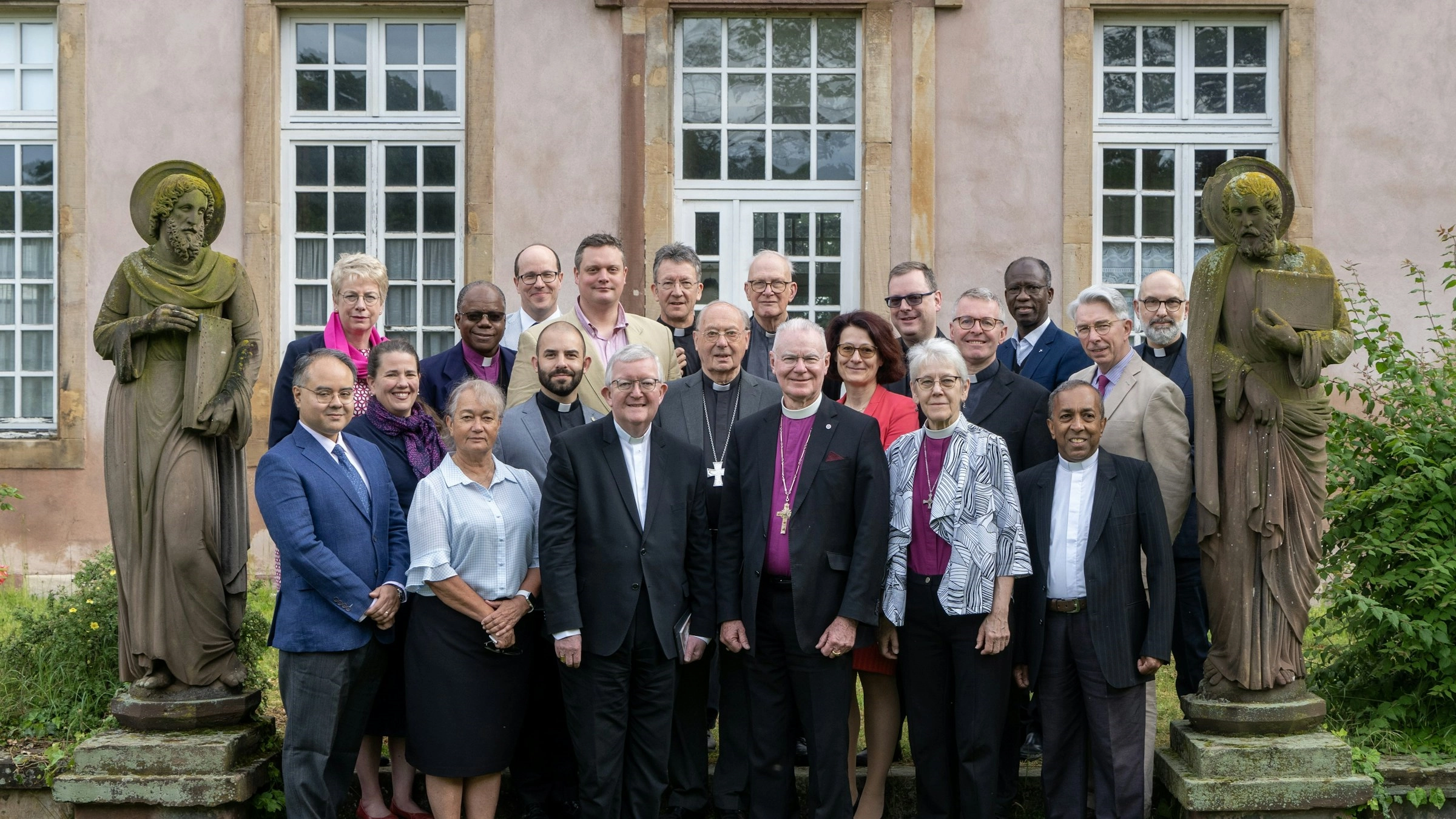
Anglican-Catholic dialogue examines churches’ ethical teachings
— May 29, 202429 mai 2024
Recognizing that the Christian churches continually are called to grapple with new moral issues and that reaching different conclusions can complicate the search for Christian unity, a commission of Catholic and Anglican bishops and theologians has been studying how their traditions make decisions and what they can learn from each other.
Members of the official Anglican–Roman Catholic International Commission (ARCIC) met May 11-18 in Strasbourg, France, to continue their examination of “how the Church local, regional and universal discerns right ethical teaching,” according to a statement released May 27.
“For the first time in its work, ARCIC III has chosen to include two case studies as part of its reflection — one where Catholics and Anglicans reached broadly the same teaching, and one where they did not. These case studies, on Enslavement and Contraception, illustrate the doctrinal and structural similarities and differences between the two communions and also serve to highlight unresolved questions,” the statement said.
… Read more » … lire la suite »

Christian Witness in an Increasingly Multi-Faith (and Secular) Canada | One Body
— May 16, 202416 mai 2024
A few weeks ago, I attended the “Grand Opening” event of a new Buddhist Temple recently constructed in my north Edmonton neighbourhood. It was a beautiful event, marked by ritual and ceremony, hospitality and fellowship. It also involved a fair bit of informal interfaith dialogue with the monks of the temple and between fellow visitors of various traditions, who, like me, appreciated the opportunity to see inside the temple and to learn what this new community was all about.
This is now the third new non-Christian prayer space and second Buddhist temple to open in my neighbourhood in recent years, the other being a new mosque, adding to the array of Christian churches and other prayer spaces already present there. It also reflects the diversity of the population that now lives in “our part” of the city: a population that values spiritual realities and draws life from religious traditions “ever ancient, ever new,” to steal St. Augustine’s formulation.
… Read more » … lire la suite »
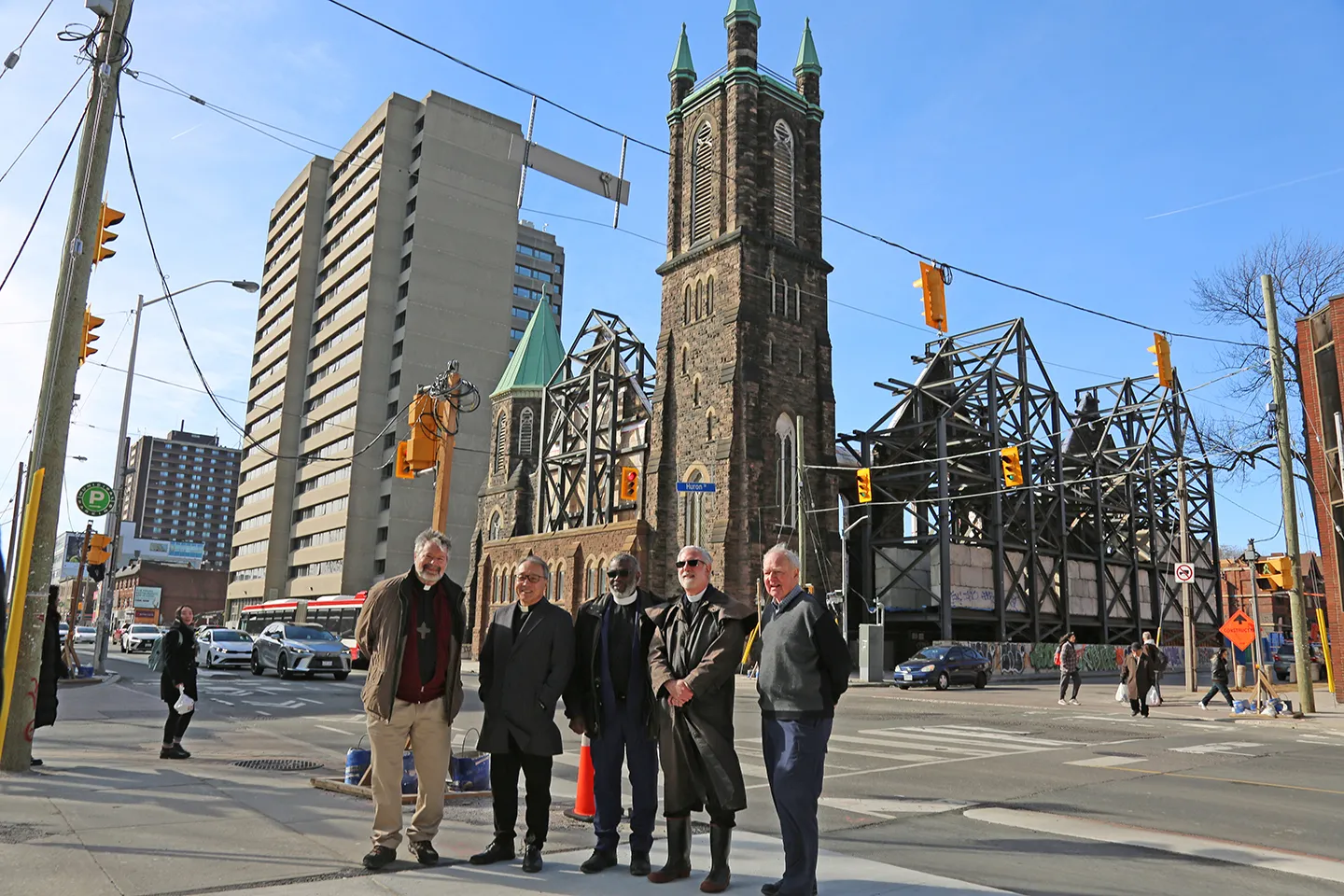
Anglican, Presbyterian, and United churches sign lease to share national office space
— May 10, 202410 mai 2024
It’s official; the national offices of the Anglican Church of Canada, the United Church of Canada, and the Presbyterian Church in Canada will be moving in together after signing leases to share space at a redeveloped church site in downtown Toronto.
General Secretary of the ACC General Synod, Archdeacon Alan Perry, said in a May 7 staff email, followed by a public news release the following day, that all three churches had signed leases to share national office space at the renovated site of Bloor Street United Church, located at 300 Bloor Street West in the Annex-University of Toronto neighbourhood. Construction on the new facility is “well underway,” he added, with a target to move in by spring 2026.
… Read more » … lire la suite »
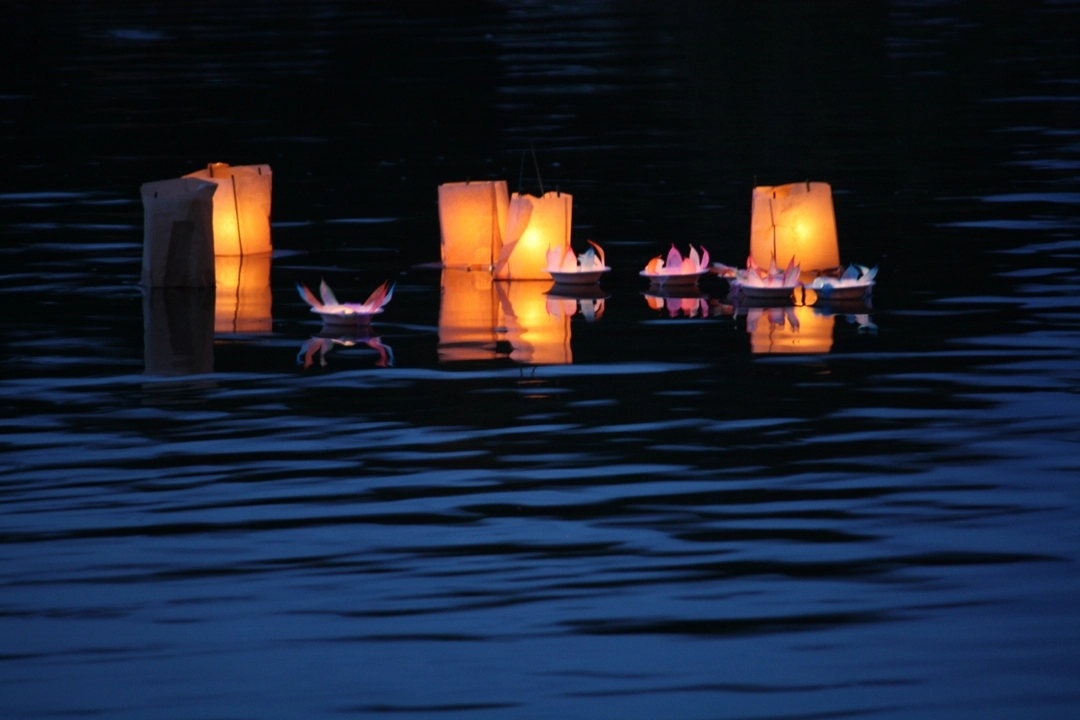
Called to Be Salt and Light: Open Up Space to Stand for Peace
— May 10, 202410 mai 2024
The Canadian Council of Churches’ Commission on Justice and Peace deplores the violence and cycle of reprisals in Palestine and Israel that is leading to thousands of lives lost and even more death, suffering, and trauma to come.
We call on Christian communities across Canada to be salt and light in a way that opens up space to stand for peace with justice for all.
… Read more » … lire la suite »
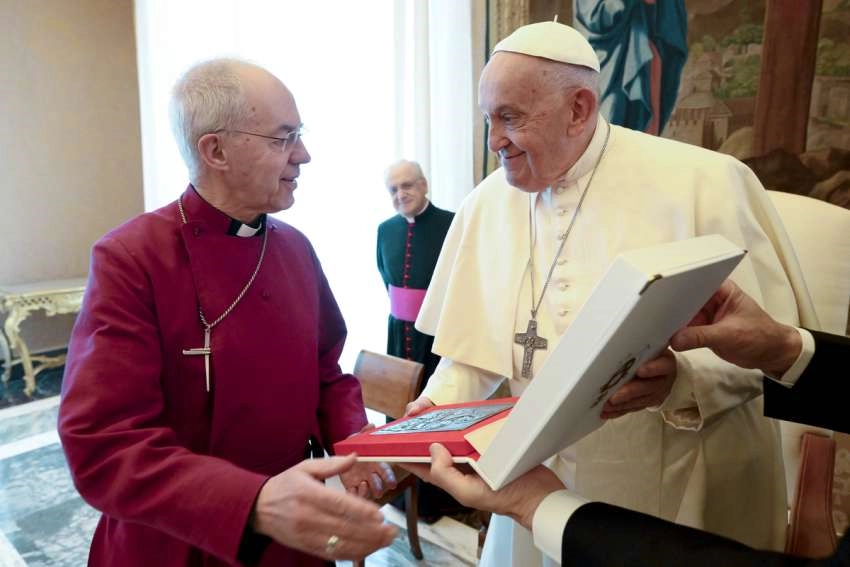
Meeting Anglican primates, Pope Francis talks about overcoming divisions
— May 2, 20242 mai 2024
Unity within Christian communities and the unity of all the churches will grow only as believers draw closer to Jesus and learn to be honest in examining if they are listening to the Holy Spirit or to their own preferences, Pope Francis told leaders of the worldwide Anglican Communion.
“We are called to pray and to listen to one another, seeking to understand each other’s concerns and asking ourselves, before enquiring of others, whether we have been docile to the promptings of the Holy Spirit or prey to our own personal or group opinions,” Pope Francis said May 2 as he welcomed to the Vatican Anglican Archbishop Justin Welby of Canterbury and the primates of the Anglican churches.
“Surely, the divine way of seeing things will never be one of division, separation or the interruption of dialogue,” the pope said. “Rather, God’s way leads us to cling ever more fervently to the Lord Jesus, for only in communion with him will we find full communion with one another.”
Pope Francis read his speech to the group, but also set aside time to respond to the primates’ questions, Archbishop Linda Nicholls, primate of the Anglican Church of Canada, told reporters. The questions, she said, allowed the pope to talk about “his own passions in ministry, unity in diversity, harmony, and he said in several ways that ‘war is always, always, always a defeat.'”
… Read more » … lire la suite »
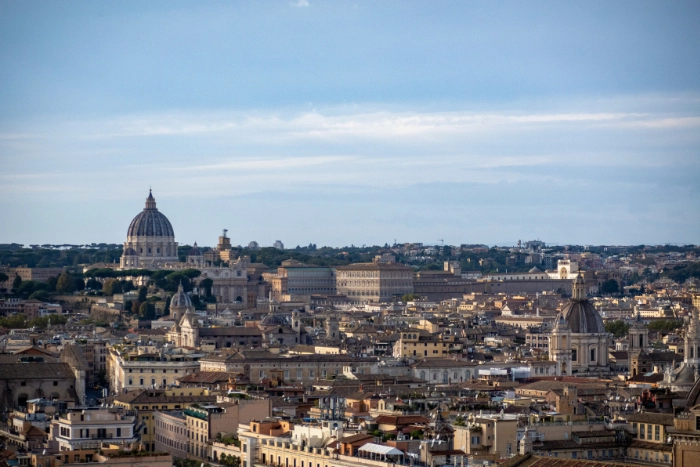
2024 Anglican Primates’ Meeting will be held in Rome for pilgrimage, consultation, and meeting with Pope Francis
— Apr. 24, 202424 avril 2024
Senior archbishops, presiding bishops, and moderators of the churches of the Anglican Communion will meet in Rome for the 2024 Primates’ Meeting (April 29-May 3). Conceived as a pilgrimage, they will pray and study Scripture together, visit holy sites in Rome, and reflect together about the mission and witness of the Church in the world.
In the first gathering of Anglican Primates to be held in Rome, the Primates’ programme will include a meeting with Pope Francis and conversation with Cardinal Grech about the meaning and promise of synodality for the whole Church.
The city of Rome is full of historical and spiritual significance for the whole Christian world. Pope Gregory the Great sent Augustine of Canterbury on mission to England in 597. Especially since the Second Vatican Council (1962-1965), Rome has been a centre of inter-Christian encounter and ecumenical research.
… Read more » … lire la suite »
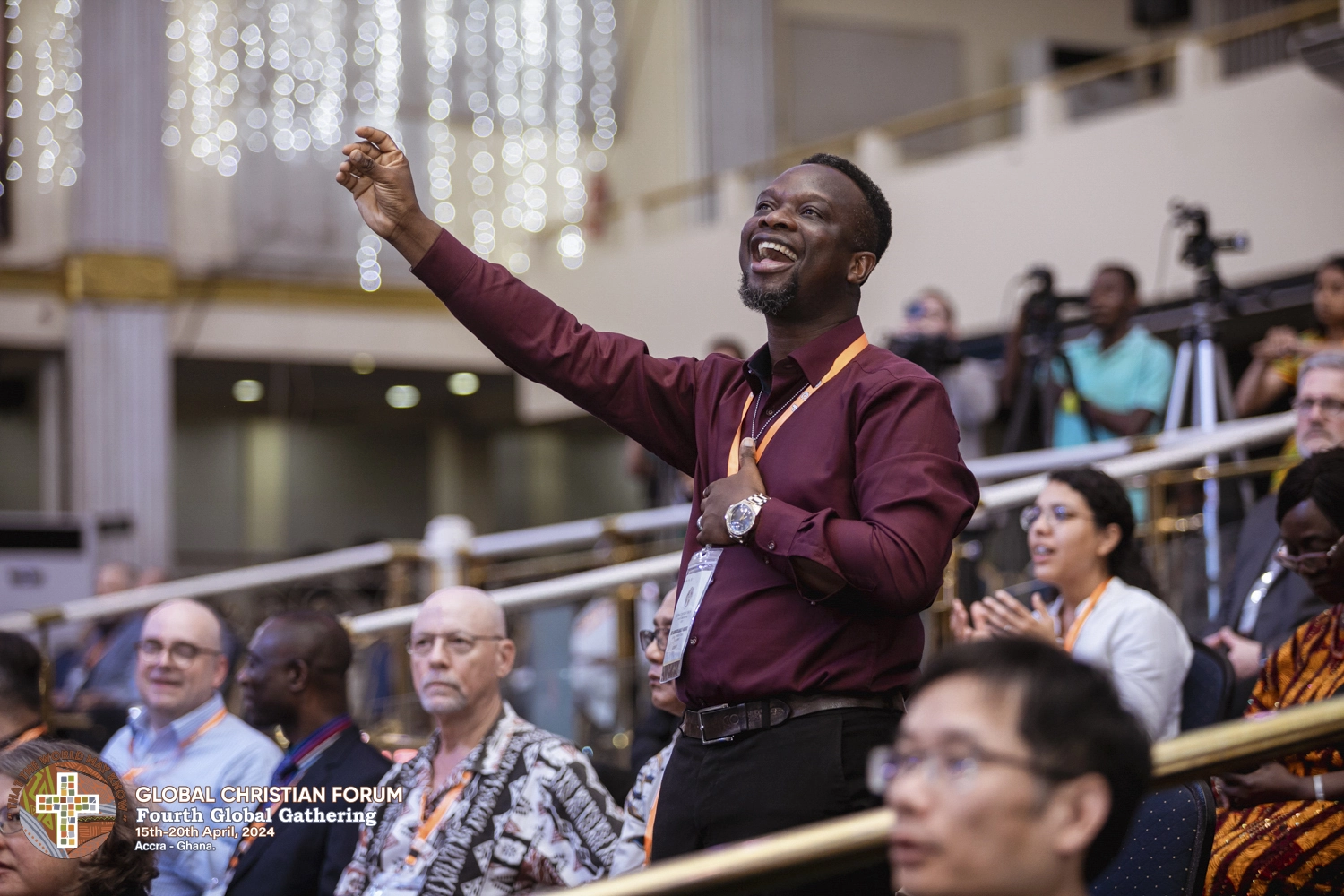
Message of the Fourth Global Gathering of the Global Christian Forum
— Apr. 20, 202420 avril 2024
The rain came with a cool breeze, driving away the humid heat through the open windows of the church. An auspicious blessing from God! So began the collective story of the 4th Global Gathering of the Global Christian Forum in Ghana, a country where Christianity is vibrant and thriving. An outpouring of hospitality and generosity characterised our time together from 16-19 April, 2024.
The very first youth gathering in GCF’s history preceded the main Forum from 13-15 April. The diversity and vision of the young adults gave energy to their own conversations about justice, hope, and reconciliation.
This is the 25th Anniversary of the Global Christian Forum, something we celebrated joyfully. Throughout its existence, the GCF has been a unique space for all major streams of Christianity to be together for encounter and prayer. It is the broadest expression of Christian faith and one that reflects the movement of the majority of churches from the global north to the global south.
… Read more » … lire la suite »



